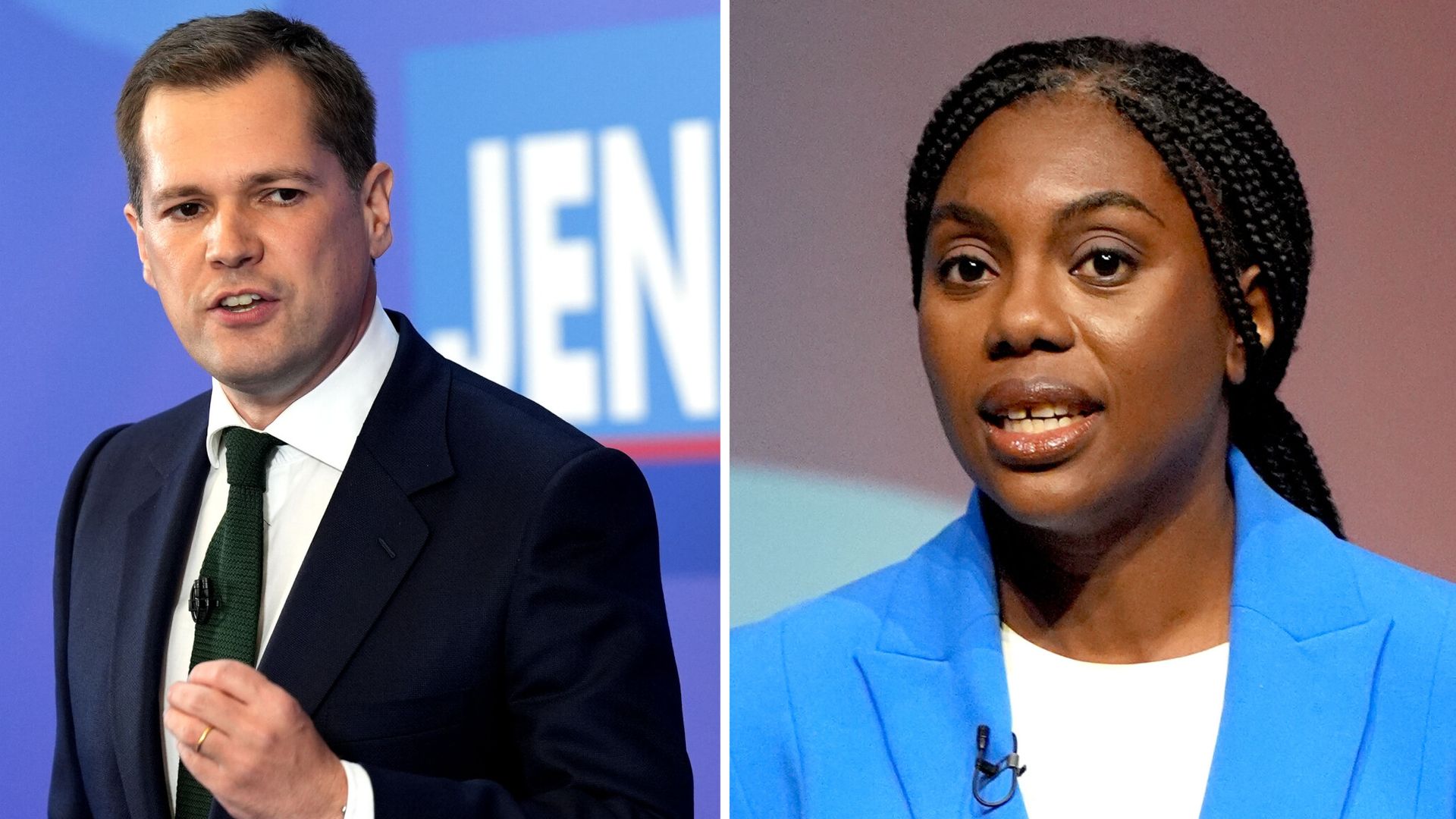The next leader of the Conservative party will be announced on Saturday, following a run-off between Kemi Badenoch and Robert Jenrick.
The winner will replace Rishi Sunak as the leader of the opposition, after he led the party to a crushing election defeat in July, losing almost two thirds of its MPs.
His successor faces the daunting task of rebuilding the Tory party after years of division, scandal and economic turbulence, which saw Labour eject them from power by a landslide.
Politics latest: Budget given ‘clean bill of health’
Voting by tens of thousands of party members, who need to have joined at least 90 days ago, closed on Thursday. Both candidates have claimed the result will be close.
The Conservatives do not disclose how many members the party has, but the figure was about 172,000 in 2022, and research suggests they are disproportionately affluent, older white men.
Both candidates are seen as on the party’s right wing. Kemi Badenoch, 44, is the former trade secretary, who was born in London to middle-class Nigerian parents but spent most of her childhood in Lagos.
Is the farmers’ inheritance tax the new pasty tax?
Whole Tory cabinet knew Rwanda Bill wouldn’t work, Robert Jenrick says
Ex-Tory MP Aaron Bell carried out ‘brazen and drunken’ sexual misconduct in parliament bar, watchdog finds
After moving back to the UK aged 16, she stayed with a family friend while taking her A-levels, and has spoken of her time working at McDonald’s as a teenager.
Having studied computer science at Sussex University, she then worked as a software engineer before entering London politics and becoming MP for Saffron Walden in Essex in 2017.
Ms Badenoch prides herself on being outspoken and has said the Conservatives lost because they “talked right and governed left”. But her critics paint her as abrasive and prone to misspeaking.
At the Conservative Party conference, a crucial staging post in the contest, she began her speech which followed three other male candidates by saying: “Nice speeches, boys, but I think you all know I’m the one everyone’s been waiting for.”
Her rival Robert Jenrick, 42, has been on a political journey. Elected as a Cameroon Conservative in 2014, he was one of the rising star ministers who swung behind Boris Johnson as prime minister and was later a vocal supporter of Rishi Sunak.
Read more:
Badenoch hits back at criticism from MPs
Tory cabinet knew Rwanda Bill wouldn’t work – Jenrick
But he resigned as immigration minister in December 2023, claiming Sunak’s government was breaking its promises to cut immigration.
The MP for Newark in Nottinghamshire says he had a “working-class” upbringing in Wolverhampton. He read history at Cambridge University and worked at Christie’s auctioneers before winning a by-election.
After a long ministerial career where he was seen as mild-mannered, he is said to have been “radicalised” by his time at the Home Office and has focused his campaign on a promise to slash immigration and leave the European Convention on Human Rights to “stand for our nation and our culture, our identity and our way of life”.
He has put forward more policies than his rival, but attracted criticism for some of his claims – including that Britain’s former colonies owe the Empire a “debt of gratitude”.
A survey of party members by the website Conservative Home last week put Kemi Badenoch in the lead by 55 points to Mr Jenrick’s 31 with polls still open.
Please use Chrome browser for a more accessible video player
James Cleverly, the shadow home secretary and seen as a more centrist candidate was knocked out of the race last month. One of his supporters, the Conservative peer and former Scotland leader Ruth Davidson, has predicted neither Mr Jenrick nor Ms Badenoch will stay as leader until the next general election.
She told the Sky News Electoral Dysfunction podcast: “I’ve now voted for Robert Jenrick, who I don’t think will win. I struggle to believe that the person that’s the next leader of the Tory party is going to take us into the next election in five years’ time and I struggle to believe that they’re going to leave the leadership at a time of their own choosing.”
Henry Hill, deputy editor of ConHome, said the contest which Tory officials had elected to take almost three months, has not led to enough scrutiny – because the MP rounds of voting took so long.
“We know much less [about them] than I think we should”, he said. “The problem with this contest is the party decided to go really long, but at the same time, they confined the membership vote – with just the final two – to just three weeks, and ballots dropped halfway through that process.
“We had months and months with loads of candidates in the race, but also that was the MP rounds and you’d think the MPs will have a chance to get to know these people already. For the actual choice the members are going to be making, there has been barely any time to scrutinise that.
He added: “I think the party remembers Liz Truss and Rishi Sunak taking weeks to take lumps out of each other in 2022 and wanted to avoid that. But it means the two campaigns haven’t really been attacking each other and that tends to be how you expose people’s weaknesses.”
Be the first to get Breaking News
Install the Sky News app for free
After 14 years in government under five prime ministers, it is not since David Cameron in 2005 that the party has elected a leader to go into opposition – with a long road until the next election.
Veteran ex-MP Graham Brady, who served as chair of the backbench 1922 committee, told Sky News that the position was more hopeful than after the 1997 landslide.
“The biggest challenge for a leader of the opposition in these circumstances is just to be heard, to be noticed. I came into the House of Commons in 1997 at the time of that huge Blair landslide. We worked very, very hard in opposition during that parliament, and at the next general election [in 2001], we made a net gain of one seat.
“Now, there is a huge difference between now and 1997. The Blair government remained very popular and Tony Blair personally remained very popular through that whole parliament and beyond. And in 100 days or so, Keir Starmer has already fallen way behind.
“So I think we’ve got a great opportunity. I don’t think we’re up against an insuperable challenge, but it’s a big challenge.”
Please use Chrome browser for a more accessible video player
Kate Fall, now Baroness Fall, worked with Lord Cameron in opposition and later in Downing Street when he was prime minister in the coalition government. She said the next leader needed to keep the party “united and disciplined”.
“The first thing is to think about why we lost. The second thing is what do we have to say? Then they need to be agile, they need to be reactive, but pick their fight, not fight over everything. They also need to get out and about.”
Lord Cameron travelled around the country holding question and answer sessions called Cameron Direct. “When you’re prime minister, you can’t do that as much as you like. But as leader of the opposition you can get out, talk to people, we thought it was very trendy to have a podcast and so on.”
She says this week’s budget gives the next leader “an ideological divide” to get into, but warns that the next leader must not risk alienating former Tories who switched to Labour and the Lib Dems.
Keep up with all the latest news from the UK and around the world by following Sky News
👉 Click here to listen to Electoral Dysfunction on your podcast app 👈
The leader of the opposition will cut their teeth at weekly Prime Ministers’ Questions sessions opposite Sir Keir Starmer and respond to set piece events such as the budget.
They will need to get the party’s campaign machine ready for the local elections in England in May 2025, Scottish elections in 2026 and the next general election expected in 2029.








